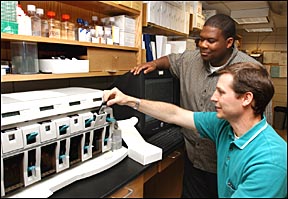|
|
|
|
|
July 25, 2003System aids gene research
Imagine crushing a leaf, processing a tiny bit of it, placing it on a chip the size of your thumbnail and putting it into a machine that some-what resembles a desktop computer. Now, imagine looking at a computer screen that shows all the genes in the leaf, and what they all were doing the instant the leaf was crushed. That's the kind of work going on at one of the newest research facilities on campus -- the Affymetrix GeneChip® Instrumentation System in the GeneChip® facility in Bessey Hall. After only four months of operation, the GeneChip® facility has placed Iowa State scientists on the cutting edge of gene research. Collaboration is a big part of the new system. Genomic researchers from a variety of disciplines seek information from bioinformatics specialists. For example, plant pathologists are working with computer scientists. All are conducting in-depth studies of how genes -- the basic biological units that pass characteristics from one generation to another -- work. The system allows researchers to investigate a variety of plant, microbial, animal and human research projects, such as how genes function differently during disease; responses to chemical, physical and environmental stresses on genes; or something as basic as cell development. It also has aided studies of gene expression -- the effect or action produced by a gene -- and is expected to increase data accuracy and reliability of genomics technology at Iowa State. The new technology can analyze up to 22,500 genes at the same time via microarrays. Microarray technology is like an improved microscope. Researchers can study how almost all of the genes in an organism are expressed under different structural and developmental conditions, which makes it easier to understand how the organism works. The gene chip instrument will facilitate studies of how various genes contribute to complex phenotypes -- the visible characteristics of genes (for example, if the proper gene is expressed, a person has red hair). Steve Whitham, assistant professor of plant pathology and a researcher in the Center for Plant Responses to Environmental Stresses, said the facility benefits Iowa State in many ways. It gives researchers the ability to acquire and analyze gene chip microarray data on campus. Having this technology is crucial for top research universities to forge ahead with new discoveries, Whitham said. "The complexity of microarray experiments and the massive quantities of data generated creates a number of problems that require expertise of people from a variety of disciplines," Whitham said. At ISU, a "microarray club," as it is called, provides a forum for researchers from a variety of fields to share their interests, technologies, resources and research results. The facility also helps faculty compete for federal research funding. Data generated by the facility will be a springboard for new or continued funding opportunities. "The facility demonstrates that Iowa State is experienced with and committed to using and developing state-of-the-art technologies to examine the functions of genes," Whitham said. "It complements technologies used in the Center for Plant Genomics for making and analyzing microarrays printed on glass slides." The facility also has allowed Roger Wise, USDA-Agriculture Research Service geneticist and ISU professor of plant pathology, to collaborate with colleagues around the United States to test and confirm the first barley gene chip array, which he led the effort to design. This is the first publicly available gene chip for cereal grains. Without the gene chip facility, the research would have been conducted elsewhere. The gene chip system will be available in a wide range of departments for graduate students, as well as to undergraduates in an NSF-funded research program in molecular biotechnology and genomics. |
|
Ames, Iowa 50011, (515) 294-4111 Published by: University Relations, online@iastate.edu Copyright © 1995-2003, Iowa State University. All rights reserved. |
